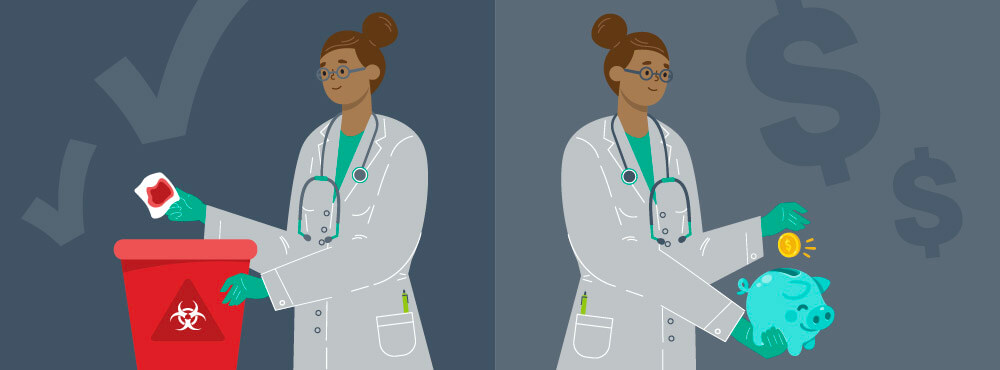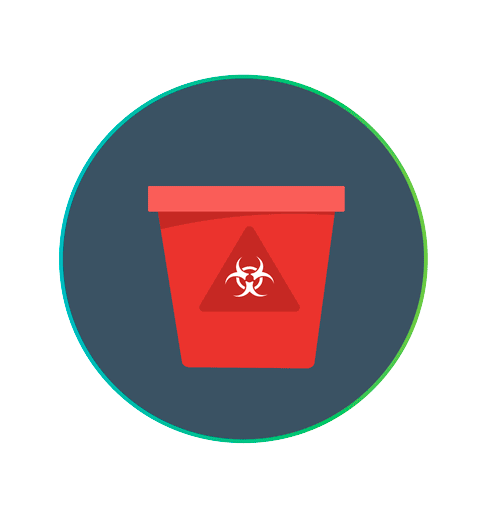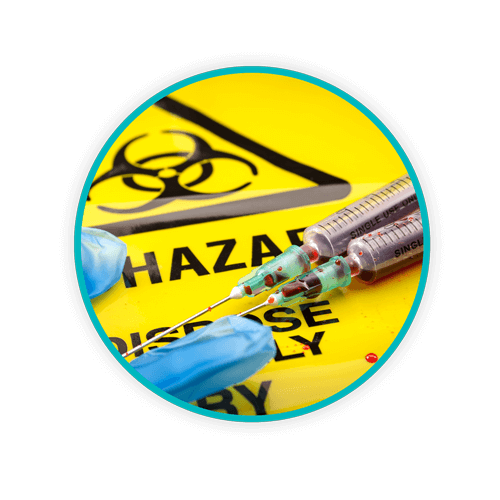How Proper Hospital Waste Disposal Saves Practices Money

TOPICS WE WILL COVER:
1 / Effective and Responsible Hospital Waste Disposal Saves Money
2 / Improperly Segregated Hospital Waste Costs More
3 / Hospital Medical Waste Liability
How Effective and Responsible Hospital Waste Disposal Saves Practitioners Money
Every facility that performs medical services for humans or animals — whether it’s a hospital setting, nursing home facility, dentist’s office, medspa clinic, veterinary hospital, or other clinical settings — must have a strategy for disposing of its medical waste. Effective hospital waste disposal not only protects patients, hospital staff, and the community at large, it also saves resources, money, and valuable time.
The COVID-19 crisis has demonstrated how chaotic and overwhelmed hospitals and medical settings can become. Understaffed medical settings with overworked doctors, nurses, and administrators are at risk of inefficiencies and costly mistakes, and hospital waste disposal is one of the most vulnerable areas when a medical setting is under strain. This lack of organization can cause significant long-term safety problems as well as major compliance issues. As a result, the medical center can be hit with extensive costs and suffer insurmountable blows to its reputation.
Every medical setting must scrutinize their hospital waste disposal processes, from their individual policies and procedures, to the training of their staff, to real-world habits and behaviors. Every member of the staff should receive in-depth, comprehensive instruction on which category of waste goes into which receptacle, so that standards are never relaxed and biohazardous waste doesn’t go into a general trash bin. Reminders of which refuse goes into which bin should be prominently displayed, and the overall culture must prioritize safe and proper hospital waste disposal at every level. Correct hospital waste disposal isn’t merely a matter of blindly following a set of bureaucratic rules — it means preserving the safety of the patients, staff, and community.
Improperly Segregated Hospital Waste Disposal Raises Costs
According to a research paper published in 2017 that surveyed over 1,000 gastroenterologists and endoscopy staff, under 1 percent of the study participants understood the processes and costs of medical waste disposal. This is an extremely expensive knowledge gap.
If your staff routinely puts non-medical waste into the red biohazard waste bags “just to be safe,” then you are significantly overpaying for medical waste disposal. Regulated Medical Waste (RMW) is estimated to cost hospitals hundreds of millions of dollars in excess U.S. medical spending. Properly segregated RMW should only amount to less than 10 percent of a clinic’s waste. Nevertheless, RMW is often more than 50 percent of the total waste volume.
RMW must undergo special processes to render it noninfectious, and these processes are between 10 and 20 times more costly than standard waste disposal. By performing these expensive processes unnecessarily, your practice is essentially throwing money away.
Hospital Medical Waste Liability
In addition to protecting the community and environment from hazards, responsible hospital waste disposal protects medical centers from major fines. The medical center retains liability for the medical waste until that waste has been made harmless to the community.
Medical centers can run afoul of multiple agencies for waste disposal violations depending upon the type of infraction and category of medical waste. The agencies with hospital medical waste disposal oversight include:
- The Centers for Disease Control and Prevention
- The U.S. Department of Transportation
- The Drug Enforcement Agency
- The Environmental Protection Agency
- The Nuclear Regulatory Commission
- Occupational Safety and Health Administration
The fines can mount up, and if the infractions aren’t noticed for months or years, a medical center could face fines in the millions of dollars.
Different states also have different guidelines, with additional medical waste categories and varying degrees of stringency regarding which items likely will or will not release other potentially infectious materials (OPIM) when compressed in waste containers.
Reputational Challenges
If a medical facility is fined for being in violation of hospital waste disposal regulations, that facility could face reputational difficulties for years, in addition to more aggressive oversight, depending upon the severity of the infraction.
Overcoming reputation challenges is neither easy nor inexpensive. In addition to the money a clinic must spend to ensure compliance with various medical waste disposal protocols, the clinic must also bear the expense of potential legal action and public relations services.
Success in following proper hospital waste disposal can save your operations time, administrative headaches, and thousands of dollars of daily fines. If you want to ensure compliance, partner with a knowledgeable, experienced medical waste service.
Daniels Health offers comprehensive hospital waste disposal solutions, helping medical facilities dispose of their waste products responsibly, sustainably, and affordably. For additional information about our services, please visit our information page.
Let's Talk!
Your time is valuable, and we don’t want to play hard to get. You can either phone us directly on the details listed on our contact page, or feel free to fill out this short form and one of our team members will get back to you as quickly as possible.
